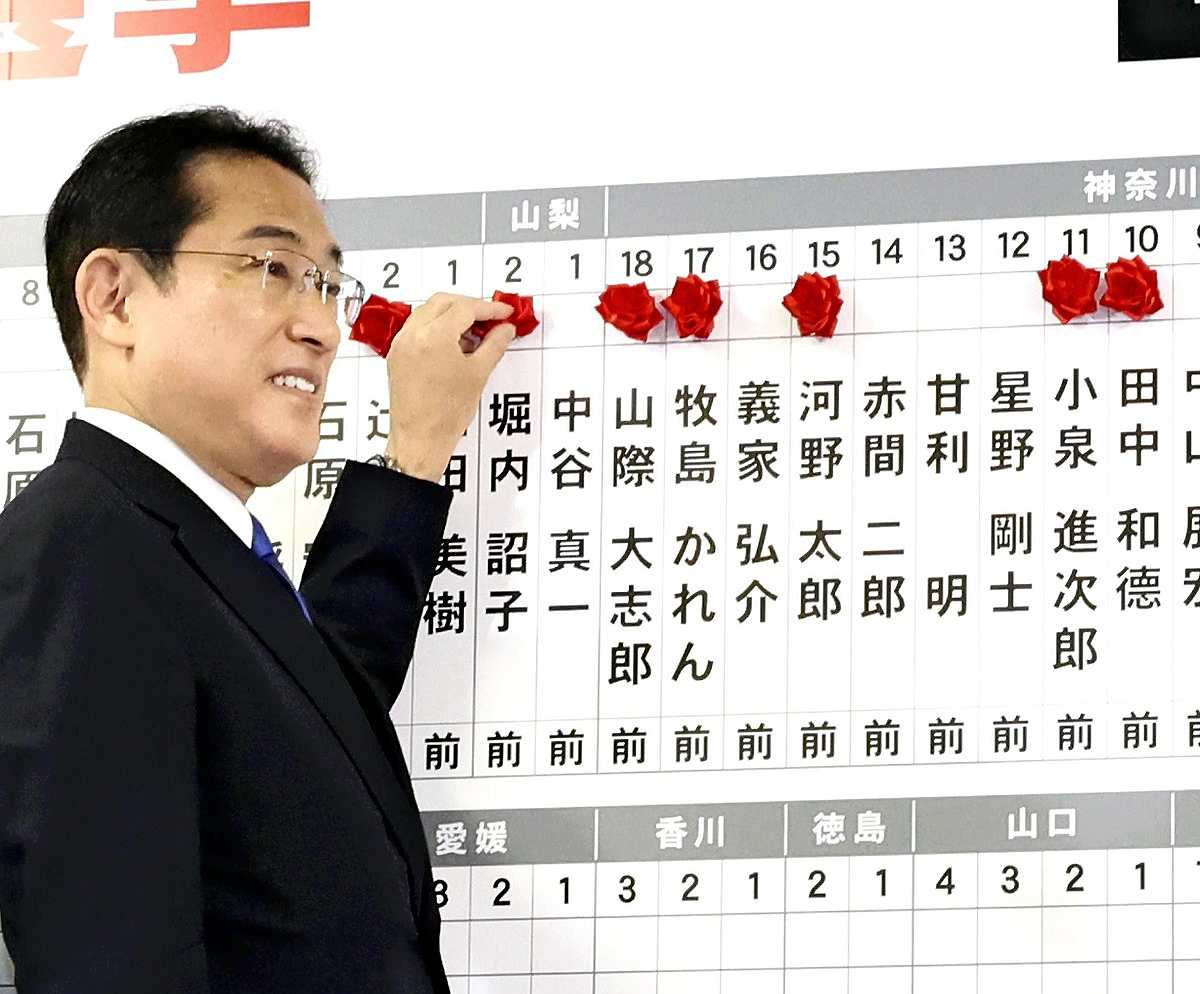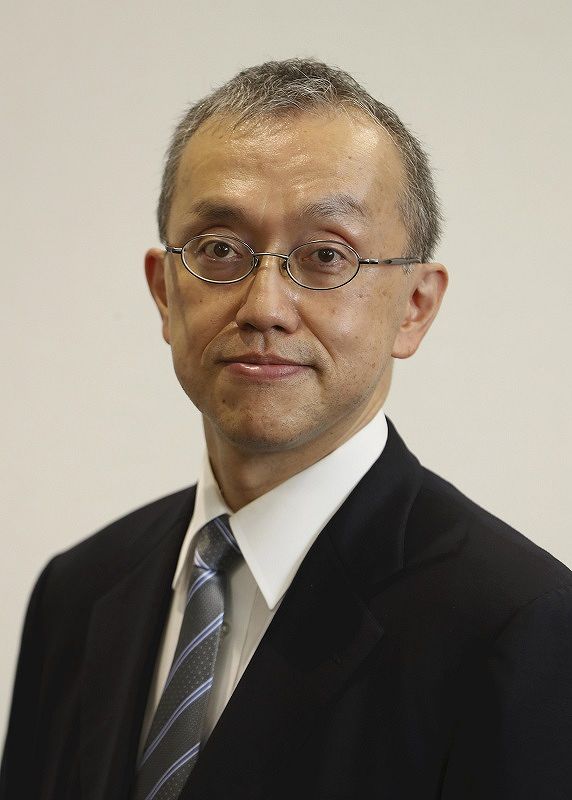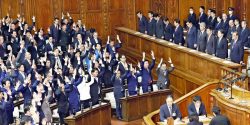
Prime Minister Fumio Kishida places a symbolic red rose on an election-night board tallying projected winners in races for House of Representatives seats at Liberal Democratic Party headquarters in Tokyo on Oct. 31, 2021.
8:00 JST, September 7, 2024
Whoever wins the Liberal Democratic Party’s Sept. 27 presidential election, they will take over the tasks and burdens currently shouldered by Prime Minister Fumio Kishida. So it is meaningful to reflect on what Kishida has done, or failed to do, to anticipate the future.
Kishida will have served in office for almost three years when he steps down in early October after his successor is elected. This seems to be a short term, but it exceeds the average tenure of Japanese prime ministers, which is nearly 2½ years, since the long-dominant LDP was established in 1955.
Since 2021, the Kishida Cabinet has beefed up the government’s national security policy through such steps as drastically increasing the defense budget and paving the way for Japan to have the capability to strike enemy bases. He has done well in diplomacy by fortifying Japan-U.S. ties through a close relationship with U.S. President Joe Biden and improving relations with South Korea. The Japanese economy has been relatively stable under the Kishida administration, even though there has been some economic turmoil: price hikes, a sudden stock price plunge, and the diminishing value of the yen.
Even so, the public has refused to give his Cabinet a passing grade, as seen in low approval ratings in opinion surveys, due to the LDP’s money scandals. Major factions of the LDP violated the law and failed to report a portion of the income from their fundraising parties in order to make hidden slush funds. Even worse, the management of the aftermath of the scandals was too slow and too clumsy. Kishida was harshly criticized for not fulfilling his responsibility to explain. It is no surprise that these scandals drew public outrage.
Adding to these issues, I suppose the more serious problem is that under the Kishida administration the LDP has lost the confidence of young voters. In Yomiuri Shimbun polls, the LDP’s approval rating among those under the age of 40 fell to 18% in August from 42% three years earlier. When the longest-serving prime minister, Shinzo Abe, announced his resignation in August 2020, the LDP was supported by more than 30% of those younger than 40.
Kishida prefers a stay-the-course approach rather than radical change. From the beginning of his administration, he seemed reluctant to boast a pro-reform stance and had refrained from using the word “reform” in his Diet speeches. That fit the well-known political style of the former Kishida faction, which was the oldest faction in the LDP and had produced several prime ministers. But this approach may no longer work these days.
Even without intending to, Kishida hurt the LDP’s image as a reformist party, which had been built up since Abe took office in 2012. It was only after the LDP’s latest “money and politics” problem came to light that Kishida reiterated the urgency of political reform. At a press conference called to announce his resignation, he said that the LDP must demonstrate change. Yes, his statement was quite reasonable, but he has so far failed to demonstrate such change.
Now, the LDP seems to be a party for the elderly or vested interest groups, and that is seen in a negative way if they really want to improve themselves.
Will the party presidential race work well to bail the LDP out of its current plight? Under some conditions it may, but those conditions would need to be rather dramatic developments in the presidential race.
Candidates in the race will vie for the votes of both Diet members and the party’s rank-and-file members. The race seems to be such a free-for-all and so hotly contested that no one will seize a majority in the first round. Diet members will hold the key in any runoff voting.
Looking back at the history of LDP presidential elections, alliances between major factions often dominated races, which made it easier to predict a winner. But now, as all factions except the one led by LDP Vice President Taro Aso have decided to dissolve, Diet members in the LDP will not be bound by the influence of former factions, and their voting behavior will be very unpredictable. Some pundits forecast that many young members who fear losing their seats in the next election will plump for a party presidential candidate who can build popularity among voters in the general public. This means that a new and different candidate has a chance to win. That has rarely happened in the history of the LDP.
What about policy disputes? As you know, policy is generally important in a presidential race. But we should acknowledge that the range of political options has narrowed.
Even though U.S. bases in Okinawa and financial support for U.S. forces have been a burden, we have no alternative but to heavily depend on the Japan-U.S. alliance. Also, even as the military threat of a self-righteous China has been growing, it remains an indispensable market for the Japanese economy, and we need to have a good-neighbor relationship with that country.
Our challenges such as an aging population, a labor shortage, and a low birth rate have no quick remedy and we will need to tackle them for generations. The Japanese government, which has already taken on massive debts, needs huge financial resources to cover increasing medical care costs and pensions for the elderly, parenting support, and expenses for the renovation of crumbling infrastructure. Consumption tax hikes, which can topple an administration, will surely be inevitable in the near future, but most candidates in this race will advocate expansionary fiscal policy as a temporary method.
A policy on how to respond to the LDP’s scandals may appeal to public sentiment, but it will never be a game changer, because every candidate is going to make a pledge to work on party reform to restore the confidence of voters. Revision of the Constitution, a pet theme for conservative party members, will also be advocated for by everyone.
In this LDP presidential race, a candidate’s popularity, debating skills, and even appearance will have more meaning than their specific policies, sense of responsibility as a politician, and ability to govern. The winner is not always guaranteed to be a good leader.
If the race heats up, the LDP will survive the next general election, which is anticipated to be held as early as this fall. Then, as one proverb says, “Danger past, God forgotten.” This has been a pattern repeated many times in the long history of the LDP.
Political Pulse appears every Saturday.

Takayuki Tanaka
Takayuki Tanaka is the president of The Yomiuri Shimbun, Osaka. His previous posts included managing editor of The Yomiuri Shimbun, Tokyo.
Related Tags
Top Articles in Editorial & Columns
-

Riku-Ryu Pair Wins Gold Medal: Their Strong Bond Leads to Major Comeback Victory
-

40 Million Foreign Visitors to Japan: Urgent Measures Should Be Implemented to Tackle Overtourism
-

University of Tokyo Professor Arrested: Serious Lack of Ethical Sense, Failure of Institutional Governance
-

China Provoked Takaichi into Risky Move of Dissolving House of Representatives, But It’s a Gamble She Just Might Win
-

Policy Measures on Foreign Nationals: How Should Stricter Regulations and Coexistence Be Balanced?
JN ACCESS RANKING
-

Japan PM Takaichi’s Cabinet Resigns en Masse
-

Japan Institute to Use Domestic Commercial Optical Lattice Clock to Set Japan Standard Time
-

Israeli Ambassador to Japan Speaks about Japan’s Role in the Reconstruction of Gaza
-

Man Infected with Measles Reportedly Dined at Restaurant in Tokyo Station
-

Man Infected with Measles May Have Come in Contact with Many People in Tokyo, Went to Store, Restaurant Around When Symptoms Emerged






















